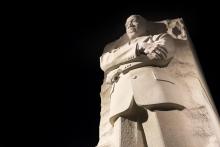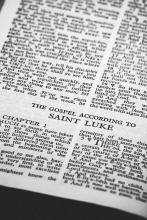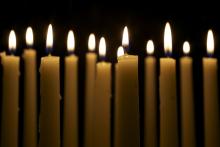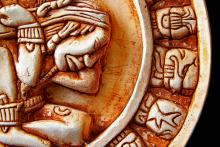Advent

I must use the adverb “almost” because there is a necessary distinction between all and some. It is the difference between mighty and almighty.
But we must never forget that whatever is mighty can harness the power to destroy lives, families, communities, institutions, and nations. This is what racism does on a daily basis.
We have, to some degree, lost the will and/or the capacity to identify and challenge this destructive and powerful force in our culture and institutions.
This Advent season presents the church with a great moment — an opportunity — to sharpen its discernment. It is an opportunity for the church and the world to experience a new birth in love, racial justice, and reconciliation.

There is an awesome moment in the opening chapter of the book of Luke where the writer frames his gospel as an epic celestial battle taking place in the heavenly realm: This is the story of the reign of men vs. the reign of God.
Luke makes it clear. What happened in these pages began in the days of King Herod of Judea (Luke 1:5). King Herod was a product and protector of empire. His father was appointed procurator of Judea by Julius Caesar. He subsequently appointed Herod military prefect of Galilee. After the death of Julius, Antony, and Octavian, Augustus Caesar favored Herod and gave him the name "king of the Jews," eventually becoming governor of Judea.
Herod was most concerned with maintaining his power — at all costs. He built the Roman Empire at his own people's expense. He built great monuments and structures, including the reconstruction of the Jerusalem Temple, enslaving his own people to do it. He used the Jews' labor to erect temples to pagan deities, and, paranoid of anyone who might usurp his power, Herod schemed against his own family, executing three of his own sons for insurrection — one only a few days before his death.
Enter a priest named Zechariah and his wife, Elizabeth.

“Sometimes I feel discouraged and think my work’s in vain, but then the Holy Spirit, revives my soul again.”
So where does this revival come? Often when we looked at a dilapidated building in our community, the revival comes with the eyes to see the possibilities of rehabbing, of new uses. The revival comes in community, in coming together to take action. There is nothing like some music and food, too, to bind us together.

Thinking back, I haven’t always been great about getting my car “winterized.” I grew up in fairly temperate Kansas, and mostly parked in a garage at home. There didn’t seem to be too great a chance of the car’s malfunctioning on me, and I was often more interested in where the car was getting me than whether it was in prime shape. I knew the car would never be perfect, but by and large, it seemed functional.
Then I moved to Chicago, where the winters were colder, the streets harder, and a garage a rare luxury. Suddenly winterizing seemed a bit more critical.
Today I am (by virtue of my baptism and in a way specifically called for by my ordination vows) partly in the business of serving as a prophet. Oh, I don’t rate myself as too great of one, but I do think that God has made me a part of that work. I may not be all of Christ’s Body, but I’m a piece of it. So prophecy and transformation are some of my duties too. And the season of Advent has me thinking a bit about whether I do enough to “winterize” my prophecy.
Invest in the transformation of lives by trying some of these fair trade, eco-friendly gift ideas or charities.

A PROFOUND SENSE of expectation launches a new year. As the season of Advent commences the Christian year, just weeks before the turn of the calendar year, familiar biblical stories invite us to begin again by glimpsing the coming reign of God. Weekly worshippers and annual attendees gather for the season premiere of the greatest story ever told. A promise. A vision. A hope. Great expectation.
The ancient prophet, psalm, gospel, and epistle together extend to the contemporary preacher words of unflinching hope that emerge fresh from the rubble of turmoil, trial, and tribulation of every God-seeking generation. Today’s words of hope must also descend like the savory aroma of a holiday meal, promising solace to the harmed, heartbroken, and hindered.
Familiarity with the Advent and Christmas narratives may leave us unaware of the radical expectation and potential impact that reciting these events can bring. These readings offer an arresting narrative of divine presence inaugurating an unprecedented commonwealth from among the divided nation. The vision makes no sense if it does not offer an alternative to the existing promises of “life, liberty, and the pursuit of happiness.” The narrative challenges us to understand that our celebration of the birth of Jesus is not shiny lights or a musical presentation. It anticipates the arrival of goodness signaling an end to corruption and gloom. This global holiday extends the drama narrated in Christian scripture as each generation must wrestle again with the contemporary relevance of the birth of Jesus.

The clouds, pregnant with rain. No light
but an inkling of light. If Advent is a time
of waiting, of joyful anticipation, why are we
so often troubled? Consider Mary, the unknown
future she holds. Or Amy, staying the day
with D—, expecting in January, alone and now
spotting with unexpected blood, baby not yet
ready. What was our life before children? Years
of memories now include the children—as if they
already were born, only we could not see them.
THE DAYS shorten and the scriptures get wild and woolly and Advent begins. Meanwhile, the secular holiday season builds in a frenzy of car commercials (does anyone really get a car for Christmas?), sale flyers, and often-forced cheer. Here are a few books—memoirs, spiritual writings, and art—that can be interesting, grounding, and inspiring companions for a complicated time of year. (They also are much easier to wrap than a car.)
Life stories
Good God, Lousy World, and Me: The Improbable Journey of a Human Rights Activist from Unbelief to Faith, by Holly Burkhalter. Convergent Books. Decades in political and human rights work convinced Holly Burkhalter that there couldn’t be a loving God—until she became a believer at age 52.
Hear Me, See Me: Incarcerated Women Write, edited by Marybeth Christie Redmond and Sarah W. Bartlett. Orbis. I was in prison, and you listened to my story. Moving works from inside a Vermont prison.
God on the Rocks: Distilling Religion, Savoring Faith, by Phil Madeira. Jericho Books. Nashville songwriter, producer, and musician Phil Madeira offers lyrical, wry observations on faith and life, from his evangelical roots to musing on a God who “knows she’s a mystery.”
CHRISTMAS, ON THE surface, looks like the most wonderful time of year—the season of love, lights, carols, candles, and family reunions, the time when Christians celebrate the birth of Jesus Christ. Look a bit deeper, though, and one might notice a more idolatrous narrative shining just as brightly: consumerism.
From Black Friday to New Year’s Day, we are inundated with the commercial demands of Christmas. For many, the list of things to do and gifts to purchase can seem endless. We buy into the mantra that the more money we spend, the more love we convey. We become lost in crowded stores, endless websites, and credit card debt. Christians often struggle to faithfully observe Advent, a time of waiting and preparation for the miraculous birth of Jesus.
While many of us purchase this spurious version of Christmas, a new movement has been born. It’s called Advent Conspiracy (AC), and its participants are seeking to turn Christmas upside down by exchanging consumption for compassion.
“Advent Conspiracy is not a four-point checklist on how to do Christmas. If anything, it’s a chance for us to rediscover the wonder and the mystery of the incarnation and what that means to us personally and what that might mean for the world,” said Greg Holder, lead pastor of The Crossing church in the St. Louis area.

[Editor's note: This article first appeared in our December 2013 issue to commemorate the one year anniversary of the Sandy Hook shooting.]
IN THE YEAR since the mass shooting at Sandy Hook Elementary School in Newtown, Conn., last Dec. 14, thousands more have died by gun violence, and the NRA seems to stymie sane firearm measures at every turn. How do we stave off despair, hold on to hope, and keep moving forward when the odds feel overwhelming? —The Editors
Bigger Than Politics
What do we say to those who are weary?
by Brian Doyle
WHAT WOULD I SAY to those who are weary of assault rifles mowing down children of all ages, every few months, for as long as we can remember now? Oregon Colorado Wisconsin Pennsylvania Connecticut Texas Massachusetts Minnesota Virginia do I need to go on? I would say that this is bigger than politics. I would say this is about money. I would say Isn’t it interesting that we are the biggest weapons exporter on the planet? I would say that we lie when we say children are the most important things in our society. I would say that the next time a tall oily smarmy confident beautifully suited beautifully coiffed glowing candidate for office says the words family values, someone tosses an assault rifle on the stage with a small note attached to it that reads Is this more important than a kindergarten kid?
We all are Dawn and Mary in our hearts and why we wait until hell and horror are in front of us to unleash our glorious wild defiant courage is a mystery to me.
I would also say, quietly, that this is bigger than rage and anger and snarling at idiots who pretend to hide behind the Constitution. I would say this is also about poor twisted lonely lost bent young men no one paid attention to, no one really cared about. And I would say that people like Dawn Hochsprung and Mary Scherlach, who ran right at the bent twisted kid with the rifle in Newtown, are the flash of hope and genius here. Those are the people I will celebrate on Dec. 14. There are a lot of people like Dawn Hochsprung and Mary Scherlach, may they rest in peace. We all are Dawn and Mary in our hearts and why we wait until hell and horror are in front of us to unleash our glorious wild defiant courage is a mystery to me. But it’s there. And there are a lot of days when I think the whole essence of Christianity, the actual real no kidding reason the skinny Jewish man sparked the most stunning possible revolution in history, is to gently insistently relentlessly edge us away from our savagely violent past into a future where Dawn and Mary are who we are, and you visit guns in museums, and war is a joke, and defiant peace is what we say to each other all blessed day long.
Brian Doyle is the editor of Portland Magazine at the University of Portland (Oregon) and the author most recently of The Thorny Grace of It, a collection of spiritual essays.
-----
An Insanity of Rationality
This spiritual disease thrives on violence and calls it good.
by Joan Chittister, OSB
THERE IS A MADNESS abroad in the land, hiding behind the Constitution, brazenly ignoring the suffering of many who, over the years, have died in its defense, and operating under the banner of rationality. It’s a rare form of spiritual disease that thrives on violence and calls it good.
They want a proper response to violence, they tell us, and, most interesting of all, they insist that only violence can control violence. If “the good guys” have guns, this argument goes, “the bad guys” won’t be able to do any harm.
The hope? The hope lies only in those who refuse to feed this addiction to violence.
This particular insanity of rationality argues that violence is an antidote to violence. Then why do we find scant proof of that anywhere? Why, for instance, hasn’t it worked in Syria, we might ask. And where was the good of it in Iraq, the land of our own misadventures, where the weapons of mass destruction we went to disarm did not even exist and the people who died in the crossfire of that insanity had not harbored bin Laden. So how much peace through violencehave all the good guys on all sides really achieved?
The insanity of rationality says it is only reasonable to arm a population to defend itself against itself. And so, day after day, the level of violence rises around us as hunting rifles and small pistols turn into larger and larger weapons of our private little wars.
Clearly this particular piece of childish logic has yet to quell the gang violence in Chicago. It didn’t even work on an army base in Texas where, we must assume, the place was loaded with legal weapons.
What’s more, it does nothing to save the lives of the good guy’s children, who pick up the good guy’s guns at the age of 2 and 3 and 4 years old and turn them on the good guy fathers who own them.
So the mayhem only increases while white men in business suits insist that their civil rights have been impugned, their right to defend themselves has been taken from them, and more guns, larger guns, insanely damaging guns are the answer. Instead of hiring more police officers, they argue that arming students and teachers themselves, nonprofessionals, will do more to maintain calm and control the damage in situations specifically designed to cause chaos than waiting for security personnel would do.
It is that kind of creeping irrationality that threatens us all.
And in the end, it is a sad commentary on our society. We have now become the most violent country in the world while our industries collapse, our educational system declines, women are denied healthcare, our infrastructure is falling apart, and there’s more money to be made selling drugs in this country than in teaching school. No wonder gun pushers fear for their lives and sell the drug that promises the security it cannot possibly give while the country is becoming more desperate for peace and security by the day.
The hope? The hope lies only in those who refuse to feed this addiction to violence. These are they who remember again that we follow the one who said “Peter, put away your sword” when it was his own life that was at stake.
The hope is you and me. Or not.
Joan Chittister, OSB, a Sojourners contributing editor, is executive director of Benetvision, author of 47 books, and co-chair of the Global Peace Initiative of Women.

ADVENT IS UPON US: Waiting for the coming of Christ. But do we really know who he is or what his kingdom brings? His Beatitudes from the Sermon on the Mount are good reminders.
Blessed are the poor in spirit, for theirs is the kingdom of heaven.
Luke’s version of the Sermon on the Mount simply has “blessed are you who are poor” (Luke 6:20). Taking Matthew and Luke together, the kingdom will become a blessing to those who are afflicted by both spiritual and material poverty. The physical oppression of the poor will be a regular subject in this kingdom, but the spiritual impoverishment of the affluent will also be addressed and healed. Spiritual poverty is often the result of having too much and no longer depending on God. Jesus offers blessings and healing to those who are both poor and poor in spirit.
Blessed are those who mourn, for they will be comforted.
Those who have the capacity to mourn and weep for the world will be comforted by the coming of this new order. Jesus’ disciples would later hear him say that loving their neighbor as themselves was one of the two great commandments (Matthew 22:39; Mark 12:31; Luke 10:27). To feel the pain of the world is to participate in the very heart of God and one of the defining characteristics of God’s people.
Blessed are the meek, for they will inherit the earth.
Christ’s kingdom turns our understanding of power upside-down. Mary’s Song, the Magnificat, promises the same when she prays about what Christ’s coming means: “He has scattered the proud ... brought down the powerful from their thrones ... lifted up the lowly ... filled the hungry with good things, and sent the rich away empty” (Luke 1:51-53). And when Jesus is asked who will be first in his kingdom, he tells them it will be the servants of all.

For a child has been born for us,
a son given to us;
authority rests upon his shoulders;
and he is named
Wonderful Counsellor, Mighty God,
Everlasting Father, Prince of Peace.
~ Isaiah 9:6
On the flight home from Connecticut, where we’d buried my beloved father a few days before Thanksgiving, I watched the film Seeking a Friend for the End of the World and dissolved into a wailing heap of tears and snot.
The premise of the uneven dramedy starring Steve Carell and Keira Knightley is this: An massive asteroid named Matlilda is on a collision course with planet Earth and in three weeks’ time, the world will come to an end. The main characters and others decide how – and with whom – they want to spend the last days of their lives.
Given recent events, this led to some soul searching on my part. If I had three weeks to live, what would I do? Where would I go? Who would I want to make sure I saw? With whom would I want to share my last breaths?
For most of my life the answer has been the same: I’d want to be with my family and, in particular, with my father.
Which is why I ended up bawling my eyes out for the last 90 minutes of the flight home to Los Angeles, much to the dismay of the fellow in the middle seat next to me.
If I had three weeks to live today, I wouldn’t be able to spend any of those moments with Daddy.
He’s in the More, now. On the other side of the veil. In Heaven. Resting in peace. With Jesus.
And I will have to wait until my earthly life ends to see him again face-to-face.

One carol I’ve been humming this Advent is “I Saw Three Ships Come Sailing In.” It’s not one I grew up singing, but I love it. The most popular contemporary lyrics talk about “three ships come sailing in” to Bethlehem on Christmas morning. Bruce Cockburn says the weird lyrics are the result of English folk in the 18th century hallucinating from eating too much ergot in their moldy English bread. Certainly there were no ships sailing into landlocked Bethlehem.

Luke 1:39-55
Sometimes, the worse the tragedy, the more abhorrent the theology it elicits.
Still numb from the overwhelming evil perpetrated against helpless children and schoolteachers last Friday, now we have to read harsh words from James Dobson and others who declare the senseless carnage a sign of God’s judgment against America. His words are disgraceful. I find them exploitative and unchristian.
Certain Christians seem compelled to speak for God in disorienting moments like these, and the results are frequently terrible. The rest of the church has a responsibility to get angry and repudiate the statements.
In times like these, I find myself wanting to disavow anyone’s attempts to speak on God’s behalf.

Advent candles lit round the world declare our longing for the coming of Christ. We wait. And, in our waiting we hope, we pray, we yearn. Advent is a season where our energies and passions for all things to be made right are kindled. Christ, the precious Baby in the manger, is coming for us all to celebrate. Consider Him.
Despite the hunger, the fatherless, the ailing. Despite the wars and senseless violence. Despite all of the reasons to say there is no redeemer.
We wait for the Christ child.
Our faith is rooted in such anticipation. Mockers have innumerable examples to declare the reasons why God is dead. Centuries of proof. Holocausts, molestation, shame. The Church waits despite its own pollution and contribution to the lack of justice.
Yet these things merely point to the coming of the Child. If the world were made right by our collective longings for occupation, for the 99 percent, for cosmic good, we’d see equitable dispersion of wealth, of food, of housing. We’d live the Marxist dream of community. We would all be haves.

Have you burned out on fiscal cliff debate yet? Depressed that our Congress has still failed to renew the incredibly noncontroversial Violence Against Women Act? Well, while Sojourners cares deeply about both of the issues, we’re also very ready to celebrate this season of Advent, our Savior’s birth, and all of the family time and Christmas cookies that come with it.
So here it is: The Top 5 Ways to Get Into the Christmas Spirit.

"Blessed is she who has believed that what the Lord has said to her will be accomplished!" - Luke 1:45
I'm thinking about promises this morning. Conceptually, that is — I've not yet progressed to specifics.
At church Sunday, the sermon was on joy. The pastor noted how much of our joy is anticipatory: we feel joy when we get great Celtics tickets, even though it's weeks before tip-off and we have no idea how the game will go. He described the joy he felt in waiting at the alter for his bride, even though he didn't know how their marriage would unfold. What we have in these moments, he said, is the promise of something we're excited to witness and be part of. And we have joy in those promises.
I have all kinds of promises from God, both the ones in the Bible and the personal ones He whispers in my ear. It's hard to believe these promises sometimes. (I tend to have more confidence that the Celtics will show up and play than I do that God will.)

Instead of celebrating a victory in war or recognizing the founding of an armed unit, South Africa renamed Dec. 16 as “The Day of Reconciliation” for the purpose of transformation, empowerment, and multi-racial national unity. In what can now be described as a dramatic conversion of symbolism, the newly redefined public holiday was celebrated for the first time in 1995.
The Day of Reconciliation is appropriately placed within the Christian liturgical season of Advent, for this period of expectation and longing for Jesus’ birth is a reminder of the ways that God’s presence heals wounds and redefines relationships. As the people of South Africa renovated their national holiday to embrace a transformed national identity, the Season of Advent prepares us to be made new through the birth of Jesus, and thus moves us to promote restored local and global communities through the practice of radical hospitality, as is written in 2 Corinthians 5:19: “God was in Christ, reconciling the world to himself, and entrusting to us the ministry of reconciliation."

This Advent, as we wait for the true light who is coming into the world (John 1:9) we pause and reflect on our Christmas hope. As a friend said last night, we do not linger forever in uncertainty but as an expectant mother who labors in anticipation of the joy her child will surely bring.
Our assurance of salvation — past, present, and future — depends on the unique person of Jesus Christ and our relationship to him, and there's perhaps nothing more central to Jesus and our relationship with him than that he became flesh, was made like us in every respect (Heb. 2:17), so that by grace we might become partakers of his divine nature (2 Peter 1:4).
This isn't something the church merely teaches but an event of history, revealed for all men and women in the one-of-a-kind person Jesus is, the human and divine Son of God. From the moment of Christ's conception, eternity himself inhabits time so that events of his life on earth long since past are forever present to us in Jesus. This is one reason our joy at Christmas is so palpable and real ... when we worship Jesus at Christmas, we are once again with Mary and Joseph on that cold, dark night as they swaddle “he who made the starry skies” and lay him in a manger.

“Faith is recognizing that if at Christmas Jesus became like us, it was so we might become more like him,” wrote the well-known preacher and activist William Sloan Coffin. He goes on to add, “We know what this means; watching Jesus heal the sick, empower the poor, and scorn the powerful, we see transparently the power of God at work.”*
Christmas really is about seeing the power of God at work, but far too often pastors and churches fail to tell this story. Oh sure, we preach about Mary and Joseph, Jesus being born in a Bethlehem manger, and the Magi following a star to find him and offer gold, frankincense, and myrrh. My fear is that the story has grown familiar and routine. We have forgotten its power and no longer see its challenge.
In Matthew’s Gospel, the Magi seek out Jesus after hearing of his birth. In order to find him they ask King Herod where they can find the new king. This, of course, is news to Herod who is surprised to learn that his title has been claimed by a baby. Herod consults his advisors and then reacts with the expected calmness of a leader anticipating a conflict, which is to say his response is not calm at all.
This story is an announcement that Jesus has arrived to challenge the powerful. The Messiah was not born meek and mild.